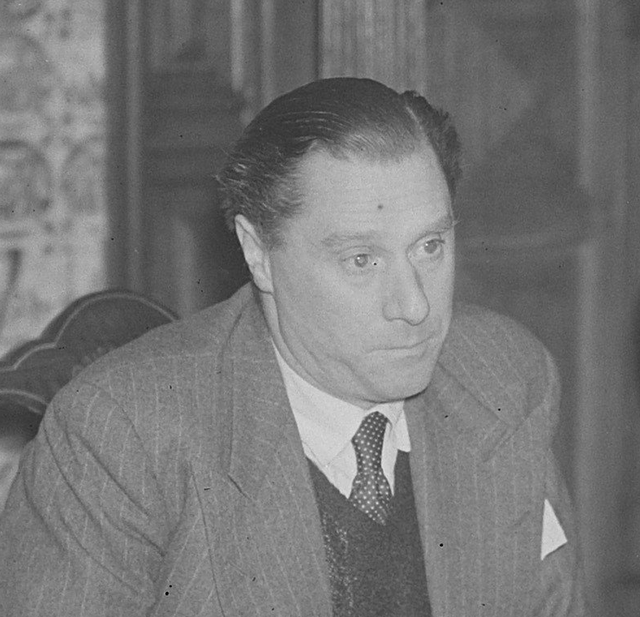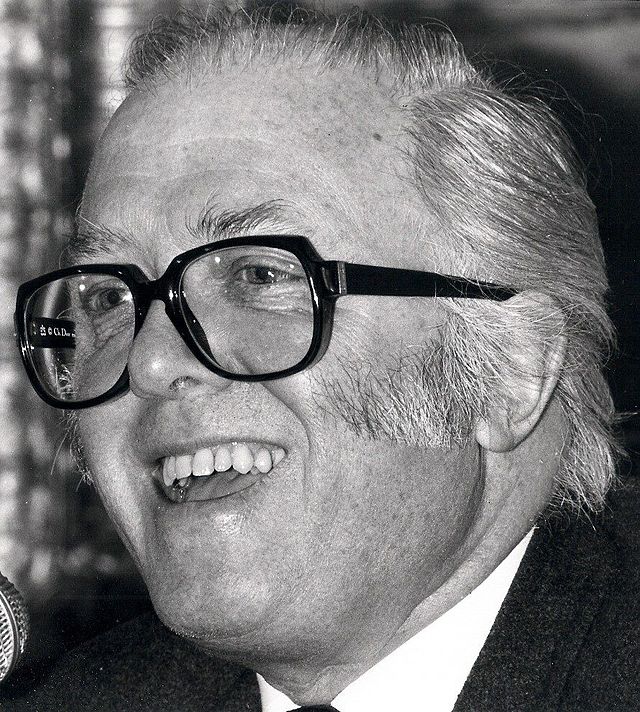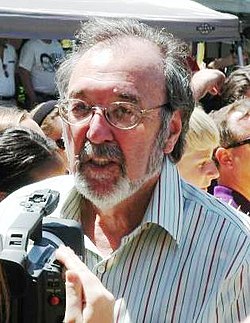Top Qs
Timeline
Chat
Perspective
Academy Award for Best Director
Category of film award From Wikipedia, the free encyclopedia
Remove ads
The Academy Award for Best Director (officially known as the Academy Award of Merit for Directing) is an award presented annually by the Academy of Motion Picture Arts and Sciences (AMPAS). It is given in honor of a film director who has exhibited outstanding directing while working in the film industry.
The 1st Academy Awards ceremony was held in 1929 with the award being split into "Dramatic" and "Comedy" categories; Frank Borzage and Lewis Milestone won for 7th Heaven and Two Arabian Knights, respectively.[1] However, these categories were merged for all subsequent ceremonies.[2] Nominees are determined by single transferable vote within the directors branch of AMPAS; winners are selected by a plurality vote from the entire eligible voting members of the academy.[3][4][5]
For the first eleven years of the Academy Awards, directors were allowed to be nominated for multiple films in the same year. However, after the nomination of Michael Curtiz for two films, Angels with Dirty Faces and Four Daughters, at the 11th Academy Awards, the rules were revised so that an individual could only be nominated for one film at each ceremony.[6] That rule has since been amended, although the only director who has received multiple nominations in the same year was Steven Soderbergh for Erin Brockovich and Traffic in 2000, winning the award for the latter.
The Academy Awards for Best Director and Best Picture have been very closely linked throughout their history. Of the 91 films that won Best Picture and were also nominated for Best Director, 70 won the award.[7][8] The award has been criticised in recent years for failing to recognise female directors.[9] Of the 257 individual directors nominated in the history of the award, only 9 have been women;[10] and only 3 of the 76 winners have been women.[11]
Since its inception, the award has been given to 74 different directors or directing teams. As of the 97th Academy Awards ceremony, American filmmaker Sean Baker is the most recent winner in this category for his work on Anora.
Remove ads
Winners and nominees
Summarize
Perspective
In the following table, the years are listed as per Academy convention, and generally correspond to the year of film release in Los Angeles County, California; the ceremonies are always held the following year.[12] For the first five ceremonies, the eligibility period spanned twelve months from August 1 to July 31.[13] For the 6th ceremony held in 1934, the eligibility period lasted from August 1, 1932, to December 31, 1933.[13] Since the 7th ceremony held in 1935, the period of eligibility became the full previous calendar year from January 1 to December 31.[13]































































Indicates the winner |
1920s
1930s
1940s
1950s
1960s
1970s
1980s
1990s
2000s
2010s
2020s
Remove ads
Multiple wins and nominations
Multiple wins
Three or more nominations
Remove ads
Age superlatives
Records
- John Ford has received the most awards in this category, with four. Frank Capra and William Wyler won three each.
- Wyler has the most nominations, with 12—including a record four years in a row. Martin Scorsese is currently second, with 10 nominations.
- Clarence Brown has the most nominations without a win (6). Alfred Hitchcock and King Vidor each received 5 nominations without a win.
- Four directors have won twice for films that did not win Best Picture: Frank Borzage, George Stevens, Ang Lee, and Alfonso Cuarón.
- Of John Ford's four wins, the only film which also won Best Picture was How Green Was My Valley (1941).
- Ford (1940–1941), Joseph L. Mankiewicz (1949–1950), and Alejandro González Iñárritu (2014–2015) are the only directors to have won the award in two consecutive years.
- Francis Ford Coppola is the only director to be nominated for each film of a trilogy, The Godfather trilogy, winning for the second film.
- Four directing teams have been nominated together (a total of five times, winning on three occasions): Robert Wise and Jerome Robbins for West Side Story (1961, winners); Warren Beatty and Buck Henry for Heaven Can Wait (1978); Joel and Ethan Coen for No Country for Old Men (2007, winners) and True Grit (2010); and Daniel Kwan and Daniel Scheinert for Everything Everywhere All at Once (2022, winners).
- The Coen Brothers are the only siblings to have won the award.
- Six directors won the award for their feature film debut: Delbert Mann for Marty (1955), Jerome Robbins for West Side Story (1961), Robert Redford for Ordinary People (1980), James L. Brooks for Terms of Endearment (1983), Kevin Costner for Dances With Wolves (1990), and Sam Mendes for American Beauty (1999).
- Robbins is the only director to have won for his only career directing credit.
- Lina Wertmüller was the first woman nominated in the category, for Seven Beauties (1976).
- Kathryn Bigelow became the first woman to win the award, for The Hurt Locker (2009).
- Chloé Zhao is the first woman of color to win the award, for Nomadland (2020).
- Jane Campion is the first woman to be nominated twice for the award: The Piano (1993) and The Power of the Dog (2021)—winning for the latter.
- John Singleton is the first Black (and youngest) nominee for Boyz n the Hood (1991).
- Steve McQueen is the first Black nominee to direct a Best Picture winner, for 12 Years a Slave. Barry Jenkins subsequently did the same three years later, with Moonlight (2016).
- David Lean was the first non-American to win—and twice, for The Bridge on the River Kwai (1957) and Lawrence of Arabia (1962). This did not recur for five decades with any other non-American directors, until Ang Lee, Alfonso Cuarón, and Alejandro González Iñárritu each won twice themselves.
- Lee was the first Asian director to win the award, for Brokeback Mountain (2005). He won again for Life of Pi (2012).
- Cuarón was the first Mexican (and Latin American) director to win the award, for Gravity (2013). He won again for Roma (2018).
- No married or ex-married couple have won the award for the same film, though James Cameron (1997's Titanic) and Kathryn Bigelow (2008's The Hurt Locker) were the first (and so far, only) ex-married couple to both win the award.
- It was also the first time in Oscar history that ex-married couple were nominated against each other in competition for an award in the same year.
Remove ads
Notes
- The Circus originally received a nomination for Best Director (Comedy Picture), as well as nominations for Best Actor and Best Writing (Original Story), all for Charlie Chaplin. However, the Academy subsequently decided to remove Chaplin's name from the competitive award categories and instead to confer upon him a Special Award "for acting, writing, directing and producing The Circus".
- The 2nd Academy Awards is the only ceremony for which there were no official nominees. Subsequent research by AMPAS has resulted in a list of unofficial or de facto nominees, based on records of which films were evaluated by the judges. While Frank Lloyd won for The Divine Lady, his other two nominated films are considered to be a single combined nomination.
- According to the Oscars.org database, Brown's directing nomination counts as one singular, joint, cumulative nomination for two films. This same recognition was applicable to all nominees, such as to Greta Garbo's acting nominations from the same respective films; as well as acting winners, Norma Shearer and George Arliss. No explanation was given for why the latter two were nominated with two films, yet only awarded for one each.
- Michael Curtiz was not on the original ballot of nominees. However, after the year prior with Bette Davis's omission for Of Human Bondage, the resulting furor led to a write-in campaign determined to secure her a nomination. Thus, the Academy relaxed their rules and allowed her performance to be amongst the competition. They permitted this once more, prompting further submissions: Curtiz; Paul Muni for Black Fury; and several other categories, including Hal Mohr for A Midsummer Night's Dream. Ultimately, Mohr became the only person to win an Oscar as a result of this process. The Academy discontinued this option from the next ceremony forward to prevent any recurrence.
- The eligibility period for the 93rd ceremony was extended through to February 28, 2021, due to the impact of the COVID-19 pandemic.
- Wise earned two individual nominations (resulting in one win); and one joint nomination with Jerome Robbins, which also resulted in the pair of them winning.
- While the Coen Brothers, as a directing duo, earned two nominations, their work on Fargo was credited as being split apart: Ethan was given sole producer credit, while Joel was listed as the sole director. Joel thus has one additional directing nomination combined with his work as part of their dual efforts.
Remove ads
See also
References
Bibliography
External links
Wikiwand - on
Seamless Wikipedia browsing. On steroids.
Remove ads

